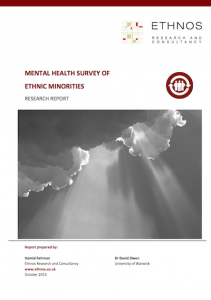
It is well documented that there are differences in how patients are treated, depending on their ethnicity. Previous inquiries in the UK have suggested that the NHS is institutionally racist (Blofeld et al, 2003). Some groups, for example those from African Caribbean or Aboriginal descent, experience more coercive care and poor outcomes, including higher doses of psychotropic medication, more detentions under the Mental Health Act, increased length of stay, and more secure placements (NHS Confederation, 2012).
Therefore, first contact with mental health services is incredibly important in retaining trust and preventing coercion, but also in enabling timely and effective support towards recovery. It is known that more coercive routes to care increase the likelihood of people disengaging from services, and prevent opportunities for recovery in those with a history of contact with mental health services.
A new review by Anderson and colleagues aims to examine ethnic differences in pathways to care for first episode psychosis in developed countries.
Methods
The authors conducted a systematic literature review of Medline, HealthStar, Embase and PsycINFO. Literature was included in line with inclusion/exclusion criteria. Meta-analysis of data produced odds ratios with the Metan procedure. The analysis focused on three specific pathways into care:
- GP involvement
- Police involvement
- Involuntary admissions
Results
- 8 papers of 7 studies were included (2 from Canada, 5 from UK)
- Compared to White patients:
- Black patients had a decreased likelihood of GP involvement (OR = 0.70, 0.57 to 0.86)
- Black patients had an increased likelihood (twice as likely) of Police involvement (OR = 2.11, 1.67 to 2.66)
- Black patients may be more likely to have involuntary admissions, however the analysis wasn’t possible
- There were no statistically significant differences for Asian patients

Compared with White patients, Black patients were more than twice as likely to have Police involvement during their pathway to care for first episode psychosis
Conclusions
The authors concluded:
Black patients are less likely to have GP involvement and more likely to have contact with police on the pathway to care, as compared to White patients.
Discussion
The continued mistrust of mental health services by the Black community clearly impacts on their experiences of diagnosis and treatment. But more importantly if first contact with mental health services is the result of coercive measures a bad precedent is set for future contacts. Fast access to health care is clearly important, firstly it makes it less likely that coercive means will be used by mental health services, and undoubtedly leads to better opportunities for recovery.
The author’s don’t really unpick why these different pathways exist or are able to drill down in sufficient detail beyond the broad descriptors of Black, White, and Asian. However, previous studies have highlighted the institutional racism and differential treatment of the African Caribbean community, particularly those of second or third generations (CQC, 2011).
Limitations
This study had a number of limitations:
- The focus on GP interventions meant that only a small number of developed countries have produced relevant research
- There was no analysis beyond Black, White or Asian groups. There is clear evidence of differences within these groups, particularly in those from African Caribbean descent
- Most studies appear to have been historically underpowered
- Finally, pathways to care are difficult to define and measure. The authors concluded that more qualitative research would be helpful in unpicking these differences in pathways to care
Links
Anderson KK, Flora N, Archie S, Morgan C, McKenzie K. A meta-analysis of ethnic differences in pathways to care at the first episode of psychosis. Acta Psychiatr Scand. 2014 Feb 28. doi: 10.1111/acps.12254. [Epub ahead of print] [PubMed abstract]
Blofeld, J. et al Independent Inquiry into the death of David Bennett (PDF). Norfolk, Suffolk and Cambridgeshire Strategic Health Authority, Dec 2003.
Race equality in mental health (PDF). NHS Confederation Mental Health Network, May 2012.
Count me in 2010: results of the 2010 national census of inpatients and patients on supervised community treatment in mental health and learning disability services in England and Wales (PDF). Care Quality Commission, Apr 2011.
Rehman H, Owen D. Mental health survey of ethnic minorities: research report (PDF). Ethnos Research and Consultancy, Oct 2013.


Black patients first contact with mental health services is more likely to be coercive: It is well documented … http://t.co/4FRLq5pMy6
Interested in yr thoughts on our blog http://t.co/VHGyvVtJKA @AfiyaTrust @BeckyCotton @Consultancy_HS #MentalHealth #Discrimination #Police
@Mental_Elf @AfiyaTrust @BeckyCotton Thanks. I will have a look.
@Mental_Elf Good to read this helpful contribution to the field. Institutional racism needs breaking down. Link to toxic interaction theory
Black patients’ first contact with mental health services is more likely to be coercive http://t.co/KNHlPhr6ja via @sharethis
My latest @mental_elf blog – first contact with mental health services – so much worse for the Black community http://t.co/YunBQMd5Kj
Black and Minority Ethnic communities continue to face discrimination in the mental healthcare system http://t.co/VHGyvVtJKA
@Mental_Elf Thanks 4 the link. Interested in project re MH advocacy? Event in NW exploring equalities May 16 http://t.co/ou5aywDitZ
Mental Elf: Black patients’ first contact with mental health services is more likely to be coercive http://t.co/NHOWqxICx1
Black patients first contact with mental health services is more likely to be coercive – The… http://t.co/bfJWq7eL8l
Today @JohnBaker_UoM blogs about a meta-analysis of ethnic differences in pathways to care for 1st episode psychosis http://t.co/VHGyvVtJKA
@Consultancy_HS Thanks+ He’s just shared that with me :-) Pls comment on the blog itself http://t.co/VHGyvVtJKA We should share your views!
This is particularly useful, giving profile to the work Kwame and others have done as it locates it in supposedly credible research methods (though I would like to challenge that notion). The findings make robust what emerges in qualitative studies and what people report anecdotally. This blog highlights institutional racism and though I 100% believe this is an issue I think that politicians, practitioners and managers hear it wrong. From what I pick up, they often think that we are accusing people working in the system of being racist whereas the main point is that the systems are constructed in a way that is informed by racial bias and it is this that we need to get under. The oversights, misunderstandings and less frequent deliberate malevolence driven by ignorance, fear or prejudice collectively create institutions that produce better outcomes and experiences for some groups over others. As you point out, the more coercive entry into the system creates something which is dynamic, i.e. people from BME groups react to this and the interaction becomes problematic.
@Consultancy_HS Tx for the blog comment Hári – really interesting http://t.co/3HWzW9hrgj @JohnBaker_UoM
@Mental_Elf @JohnBaker_UoM My pleasure. Hope your readers find it useful.
http://t.co/H2KQPRY6o7… http://t.co/PaqAfWdGDc
Black patients with 1st episode psychosis are less likely to see a GP & more likely to have contact with the police http://t.co/VHGyvVtJKA
@EdgeDawn Interested in your thoughts on our blog by @JohnBaker_UoM http://t.co/VHGyvVtJKA #Black #MentalHealth #Discrimination #Police
@Mental_Elf @JohnBaker_UoM #Institutional racism – no longer the elephant in the room?
@Mental_Elf @JohnBaker_UoM How do you eat an elephant? 1 bite @ a time http://t.co/HJbW1hyrby
Fascinating discussion today about institutional racism in mental health http://t.co/VHGyvVtJKA Get involved!
RT: “@Mental_Elf: Fascinating discussion today about institutional racism in mental health http://t.co/cUX7RT8Tky Get involved!”
@Mental_Elf @JohnBaker_UoM #instituional racism in mental health services – no longer the elephant in the room?!
@EdgeDawn @Mental_Elf @JohnBaker_UoM I’ve been thinking about that for a long time. Would love to explore it more.
@mindshackles @Mental_Elf @JohnBaker_UoM Let’s talk! Working in silos doesn’t work. Much to learn from/with each other. Unity is strength!
@EdgeDawn Do pls post a longer comment on the blog http://t.co/VHGyvVtJKA It’s hard to get points across in a series of tweets
@mindshackles @Mental_Elf @JohnBaker_UoM Look forward to receiving link to work #representations of #depression
Black patients’ first contact with mental health services is more likely to be coercive via @Mental_Elf http://t.co/QXSdaYTwHP
Don’t miss: Black patients’ first contact with mental health services is more likely to be coercive http://t.co/VHGyvVtJKA
@Mental_Elf frightening all round
From @thementalelf Black patients’ first contact with mental health services is more likely to be coercive http://t.co/SIdvnkQfmd
RT @madgifts: From @thementalelf Black patients’ 1st contact wth mental health services is more likely to be coercive http://t.co/G6csQLOXNM
RT @Time4Recovery: Black patients first contact with #mentalhealth services is more likely to be coercive via @Mental_Elf #equality http://…
My @Mental_Elf blog about ethnic differences in pathways to care for 1st episode psychosis http://t.co/YunBQMd5Kj“
Black patients’ first contact with mental health services is more likely to be coercive http://t.co/RPSePy3pay
rt @Mental_Elf Don’t miss: Black patients’ first contact with mental health services is more likely to be coercive http://t.co/uYyv6tofgQ
[…] impact of ethnicity on treatment and engagement with mental health services is well documented. John Baker’s recent Mental Elf post highlights the damning evidence behind murmurs of institutional racism within the NHS that just […]
[…] This again creates a cycle of fear, lack of trust and avoidance, and I am reminded of the groundbreaking research Breaking the Circles of Fear (PDF) published some years ago by the Centre for Mental Health (Keating et al, 2002), interestingly not referenced in this paper. A previous Mental Elf blog by John Baker also considered the ways in which black people often enter the mental health services: Black patients’ first contact with mental health services is more likely to be coercive. […]